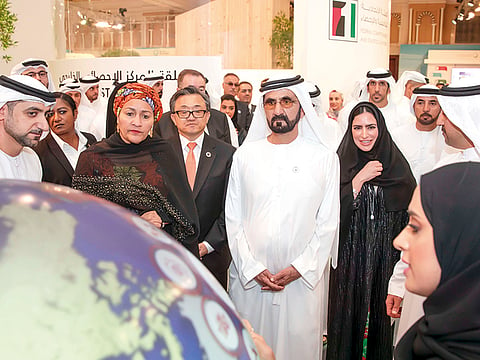World lacks data for driving progress, UN official tells Dubai forum
“We need more and better data” UN Deputy Secretary-General says

Dubai: The data revolution has yet to fulfil its purpose, Ameenah J. Mohammad, UN Deputy Secretary General, told the audience during the first day of the UN Data World Forum on Monday.
Describing the current world as “time of unprecedented challenge — but, equally, unprecedented and massive opportunity,” she emphasised that to achieve the 17 Sustainable Development Goals, “we need more and better data”.
“With accurate, representative, inclusive and disaggregated data, we can understand the challenges we face — and identify the most appropriate solutions for sustainable development,” she said during her speech at the opening plenary. Mohammad explained that natural disasters around the world cost $330 billion (Dh1,211 billion) last year alone — a cost which could be reduced through the availability of data on disaster preparedness and early warning systems.
She also pointed out that in more than two thirds of countries, there is a lack of gender disaggregated data on violence against women.
Mohammad explained that through robust and accessible data and information, trust in public institutions will strengthen and new opportunities will arise.
“It means students can find out about job opportunities and women can learn about laws protecting them from discrimination. It means citizens can monitor how their governments are performing and hold decision-makers to account,” said Mohammad.
She referred to Buenos Aires, as an example of the positive impact of data. “Google data suggests that rooftop solar potential is equal to about 946,000 tonnes of avoided emissions a year — which is the equivalent of taking 200,000 cars off the road,” she said.
With the 2030 Agenda in mind, Mohammad said the UN is leading global efforts to integrate data and information systems.
“We urgently need to bridge important gaps. Funding for data and statistical systems remains limited- and beyond funding, we need political, technical and advocacy support in all areas,” said Mohammad.
Data role in identification process
Meanwhile, Mahmoud Mohieldin, World Bank Group Senior Vice President for the 2030 Development Agenda, pointed out that current figures are worrying on a global level.
“For low-income countries we don’t have numbers for around an average of 40 per cent of the population, because they don’t have any kind of identification — and when it comes to women, we can add an additional six per cent,” he said.
As for middle-income countries, Mohieldin said around 92 per cent of the population have identification, with the number increasing to 97 per cent in high-income countries.
“Technology today is helpful and we have seen great transformation when it comes to the identification system, especially when there is good policy and leadership,” he said.



